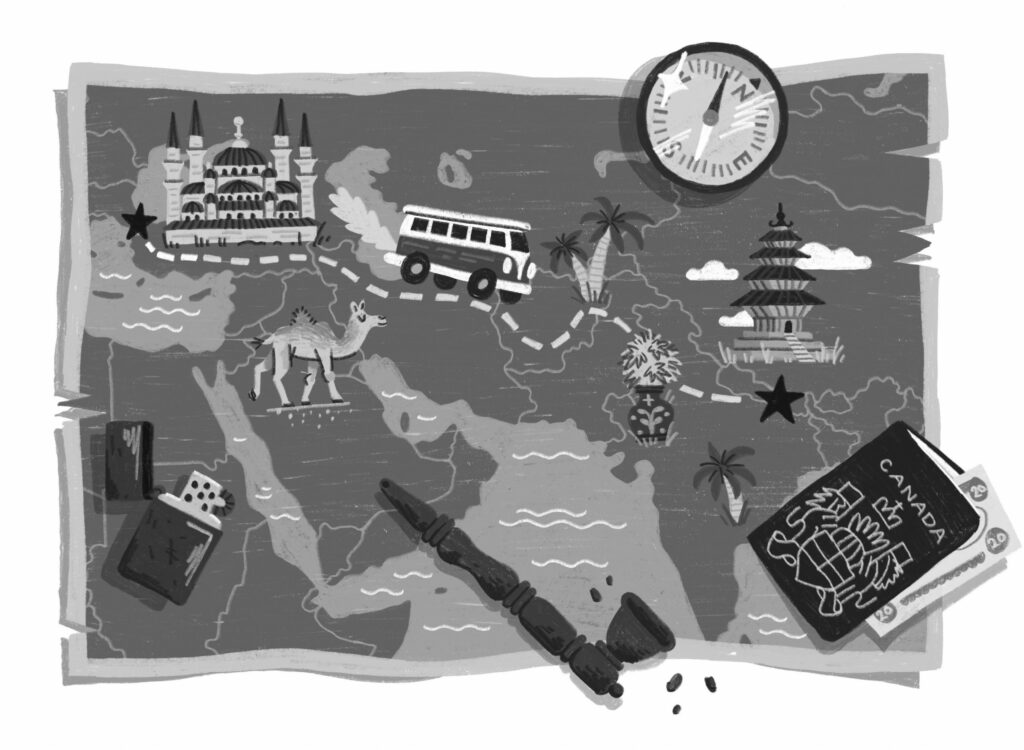In 1978, Mark Abley and his friend Clare took a break from their studies at Oxford to embark on a journey through Turkey, Iran, Pakistan, India, and Nepal. Clare looked forward to the splendid art and architecture, and Abley wanted to learn something about himself and his generation’s purpose in life. Might he even fill the “God-shaped emptiness” he felt growing inside him? The friends soon found themselves squashed into local trains and buses festooned with flowers, not fully anticipating the “ragged, discordant prelude to the shattering music of the future” that awaited them.
A fascinating chronicle of their journey, Strange Bewildering Time: Istanbul to Kathmandu in the Last Year of the Hippie Trail charts the dissipation of hopes at the end of an era. For about fifteen years, starting in the early 1960s, the famed overland trek offered young bohemians with vague dreams of peace and enlightenment a kind of grand tour that was “no more political and no less privileged than the cross-Europe journeys made by pampered aristocrats in the eighteenth century.” By the late ’70s, things were different: Punk, violence, cocaine and speed, and the ascendant New Right had almost entirely replaced hippie counterculture. The old, favoured travel destinations were growing less hospitable to what David Jenkins in his Student Guide to Asia called the “passing parade of outlandishly dressed tramps and trollops.”
Abley describes their first stop, Turkey, as “a fulcrum, a pivot, a perpetual high-wire act.” After making a secular pilgrimage to Istanbul’s touristy Pudding Shop, “whose menu juxtaposed Turkish cuisine with Western food,” the pair wandered off the beaten track to a café near the grand bazaar and watched as a coffin draped in green velvet adorned with Arabic calligraphy passed by — a fitting image of how the city “marked a definitive farewell to Europe.” They then headed deeper into unfamiliar territory, full of curiosity. In Cappadocia, a seemingly friendly mechanic unexpectedly groped Clare — the first of several such assaults. As their sense of security vanished, they had to change tack: “No longer would we assume that every offer of help was genuine.”
Nor could they assume their trip would follow the planned route. Just as they were getting their documents together for the journey to Kabul, the city fell to a Communist coup. Afghanistan closed its borders soon thereafter, and the country that had once “stood at the heart of the Hippie Trail” was off the agenda. The travellers decided instead to see more of Iran and headed south toward Isfahan, Shiraz, and beyond. Here, too, something was amiss. They learned of people’s growing frustrations with Muhammad Reza Pahlavi’s oppressive regime; though nobody knew it at the time, the Land of Poetry was only a year away from the decade’s most full-throated revolution. Abley briefly steps away from his narrative in this instance to observe, with hindsight, that “the unspoken or whispered fear of the Shah’s secret police would quickly become a whispered or unspoken fear of the Revolutionary Guards.”

The two friends quickly abandoned their planned route.
Alexander MacAskill
The ride to Pakistan brought a heightened sense of danger when the two friends realized — too late — that they had boarded a smugglers’ train. They even witnessed one of the men in charge threatening another passenger with a knife and a mock noose. Abley describes how “the sliver of rope dangled in the air like a question mark,” as if to symbolize the Oxonians’ fear. But then suddenly the aggressor about-faced and casually offered them chapatis and tea.
By the time they arrived in India, Clare and Abley had begun to tire of each other, the constant vigilance, the road, and the aggravating noise of “loudspeakers and radios, stray dogs and roosters, car horns and engines, children yelling and laughing, grown-ups arguing and lecturing.” To locals, these were the sounds of life. To foreigners, the din could be migraine-inducing. Though the trip ended quietly enough in neighbouring Nepal, a calmer place with fruit pies and looser law enforcement, the accumulated months of discomfort and political volatility made Abley question his generation’s ability to achieve world peace or personal enlightenment. He says he took away something else, however: patience, endurance, resilience.
Strange Bewildering Time focuses on the journey, but the author and Rhodes Scholar, who grew up in Western Canada, is also achingly aware throughout that he enjoyed “vast privilege based on vast injustice.” In the late ’70s, the award that funded his studies was open only to men. In South Africa and Rhodesia, where the imperialist Cecil Rhodes had made his mining fortune, that meant only white men. Abley didn’t protest, and halfway through his account he writes, “The British Empire had died, and its heart still beat faintly inside me: I had internalized a right to power.” People like him could “stick it to the Man” by growing their hair long and reading Hermann Hesse; at the same time, they were free to exercise their mobility and traipse around other people’s homelands.
Abley does not set out to teach readers how to channel guilt or privilege into action, however. Rather, he muses about all those who, like him, wanted to change things. “We would discover,” he concludes, “that the world was changing us.” Still, one wonders: would a little more protestation have been so bad?
Dave Hazzan is pursuing a doctorate in history at York University.

